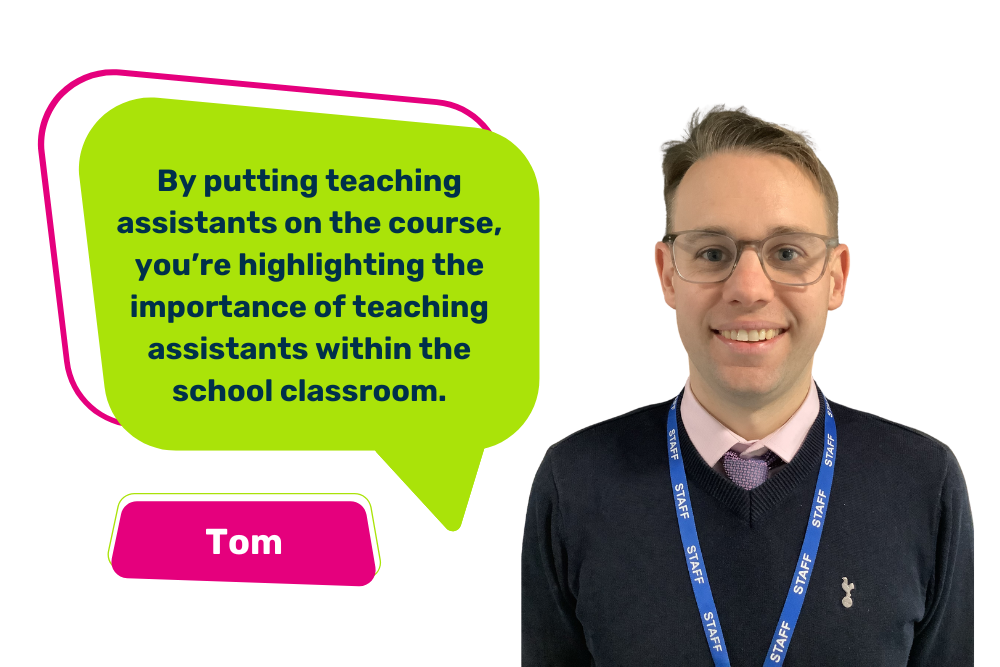Fully funded by the Multiply programme at Adult Education Gloucestershire County Council, the Numeracy Champion training was undertaken by six teaching assistants.
Maths lead and deputy headteacher Tom Daniell spoke to National Numeracy about the impact the training has had and why recognising and valuing the important work of teaching assistants is essential for a happy and well-functioning school.
How did you hear about National Numeracy’s Numeracy Champion training programme?
The headteacher received an email about it. We’d previously spoken about teaching assistants not having many opportunities to take part in CPD [Continuing Professional Development] and the training made sense for us to be a part of.
There’s so little CPD out there for any members of staff in school and unfortunately, if you’re giving that sort of CPD, inevitably it goes to teachers or SENDCOs first, so teaching assistants traditionally fall to the bottom of the list. So actually having some CPD targeted to our teaching assistants was good. Also, the training being free was a massive thing with the way school budgets are.
Did their confidence with numbers rise after completing the training?
Yes, I think so. They were already confident, but it gave the teaching assistants more information and skills to come back into the school with.
Also, by putting them on the course in the first place, you’re highlighting the importance of teaching assistants within the school classroom, rather than them just coming into school, doing their hours and then going home.
As a teaching assistant you can quite quickly get into a routine and see your role as not being as important as the teachers’, but actually they are vital if you want a good, working, solid classroom.
What was the feedback like from the teaching assistants after they’d done the training?
I think they appreciated the fact they’d had the training and had ideas to bring back. One of the things they said was a lot of it was about confidence and that side of things, so if you were confident in maths you didn’t really need that part of it, but any feedback I had was that they enjoyed the sessions.
It also started a conversation around maths. I think they enjoyed the opportunity to discuss things when they got back to school and that dialogue around maths and CPD. It got teaching assistants talking about maths and why they do specific things, why they use specific resources: “Was that a good resource to use?” “I use that with my class and that works well.”
Do you think it helped them to become more proactive in maths lessons?
Yes. It was not just about identifying the lower ability children that needed support, but actually the children that don’t get picked up to contribute as often and looking for those children within the classroom.
I think the training made them more mobile within the room and got them out of the habit of sitting with a particular child or group, which is productive.
What is maths learning like at the school now?
There’s definitely been an improvement in our maths provision in school, our results are particularly good at the moment so we’re just maintaining that high standard and that consistency. It’s shown in our end of Year 6 SATs results, which are really quite high at the moment. I wouldn’t say the training is all part of it, but it’s definitely a piece of the jigsaw that helps to support children.
Why do you think it is important for school staff to feel confident in their maths skills?
You can always tell when your teachers and teaching assistants are confident. The children pick up on it so easily and if you can portray confidence and an ease in doing something and you can make the technique you’re teaching easy to understand for the children it benefits everybody.
Would you recommend the Numeracy Champion training to other schools?
Yes, I think I probably would. Often, a lot of training takes place without the teaching assistants. They can go a long time without any training in school at all so to have training available and for it to be focused on maths, which is a core subject, is massively beneficial.





